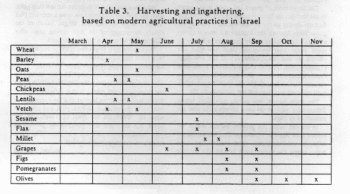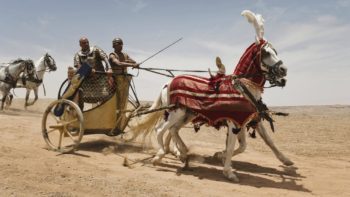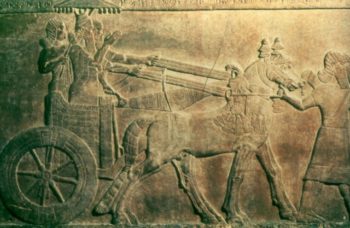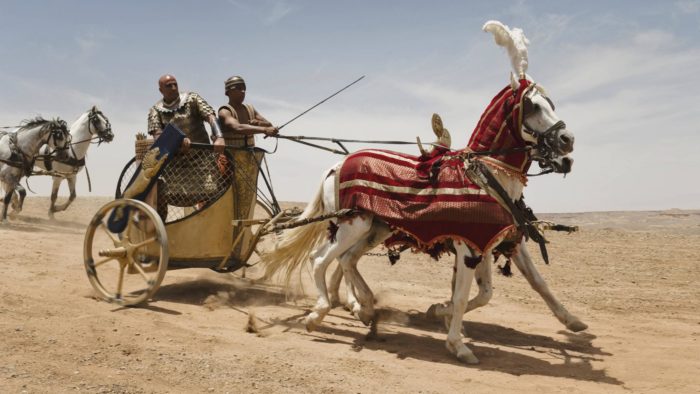The Season When Kings Go off to War
II Samuel 11:1 in the NIV says, “In the spring, at the time when kings go off to war, David sent Joab out with the king’s men and the whole Israelite army. They destroyed the Ammonites and besieged Rabbah. But David remained in Jerusalem.” The fact David stayed in Jerusalem set up the circumstances of his adultery with Bathsheba and his elimination of her husband, Uriah. Which was one of the darkest moments in the life of a king the Bible portrays as a “man after God’s heart”–but I’m not actually talking about David here. I’m here to talk about the assumption captured in the Biblical text, that springtime is wartime. Why would that be? And what does understanding seasons of warfare mean for writers of speculative fiction?
When I was younger I naively assumed the reason was because the farmers who did most of the fighting would first plant their spring crops, then have down time in the late spring and summer where they could be compelled by a king to fight in battle. As long as they were back by fall in time for the harvest, the agricultural cycle wouldn’t be disrupted at all.

The harvest cycle in Ancient Israel. Copyright: Agriculture in Iron Age Israel (Oded Borowski, 1987, page 7)
But I was mostly wrong. Check out the chart I’ve included:
Ancient Israel had a different climate than what I’m accustomed to. Harvest of some type of agricultural product took place as early as April and continued all the way through November. The only months without any kind of harvest were December, January, February, and March.
So if downtime from the agricultural cycle for farmers were the only reason kings picked a certain time to go to war, they’d go to war in the winter. Starting in December.
Now, those of you who grew up in cold weather places (like Montana, where I lived as a child) before you even say it, no, Ancient Israel was not so cold and frozen over that it would be impossible to conduct military operations in winter. Yes, war in the winter would be miserable because winter in Israel is relatively cold and it rains more then than any other time of the year. Couple that with the fact ancient clothing wasn’t very waterproof and you can see some solid reasons why people would prefer not to go out in the winter, even in the relatively-warm Near East.
I think there’s another factor that’s even more important when you consider that ancient armies of the Near East (a.k.a. Middle East) would normally load their food and other supplies on carts…also bear in mind that chariots were an important instrument of war in those days…and that there were no paved roads. Meaning that in the winter, due to rain, some parts of that region were impassible in wintertime to anything with wheels. Mud would make travel with wheeled transport miserable in some places and impossible in others. In Israel’s south (the Negev), the part-time riverbeds (wadis or arroyos) that are like the dried rivers that some modern Afghans use part of the year as highways, are prone to dangerous flash-flooding in the winter.

Egyptian chariots moving smoothly over dry land.
So you can’t effectively move an army in the Middle East (a.k.a Near East) in ancient times due to rain-made mud and flash flooding. Yeah, and it also gets miserably cold for people who grew up in that region.
So around March is the first time the ground is dry enough and it’s warm enough to move troops. And, that’s also a month of agricultural down time! If you hurry and finish the battle in less than a month, the peasant farmers can be back in time for the barley harvest in April.
But if you don’t get them back in time, you can threaten the wheat and barley harvest of your enemy, forcing him to be inside a walled city for protection, while you reap his crops to feed your troops. Making your siege more effective. Makes total sense.
Note that late in Israel’s history they’d find themselves in battle against an empire that defied the agricultural cycle, which wasn’t limited to going to war in the spring. By constructing roads and building bridges and equipping their troops with needed clothing and storing supplies systematically in key locations, the ancient Assyrians were able to conduct warfare all year round. Which was revolutionary and shocking for that era. (The Romans also mastered how to keep an army supplied year-round. Though they generally preferred not to fight in the dead of winter.)

Assyrian Emperor Tiglath Pileser III in a war chariot.
So what’s this got to do with speculative fiction stories? Potentially a lot.
If you include nations going to war in fantasy settings, you should think about the agricultural and weather cycle that affects how and when war is fought. And you should realize that warfare normally happens at a certain season.
You should also consider nations that are able to overcome that ordinary cycle. Whether they do so through technology, magic, or logistics (the way the Assyrians did), a nation that can fight all year round when their neighbors cannot, has a massive advantage over them.
So readers, are you familiar with fantasy stories in which the agricultural cycle or season of the year plays a major role in the timing of warfare? Have you written any scenes yourself in which you set a certain season or period of the year aside for warfare (not necessarily spring)? IF so, especially if your reasons are different from what I’ve mentioned above, please mention what season you picked as ideal for war and why you picked it. Or any other pertinent thoughts on this topic.







































I’m trying to remember what I know about barley. It’s a shift to start thinking in subsistence farming mode rather than the industrial mode I’m used to, that prioritizes wheat and corn.
I think barley has a shorter growth cycle than wheat does. I think buckwheat is similar, and they both prefer wetter conditions than regular wheat. So it would make sense to plant those in the wetter conditions of winter and then plant wheat in time for the drier conditions in summer.
Heck, it’s hard to remember the real growing cycle of wheat, because in the south, they plant hard red winter varieties in fall and graze cattle on it until spring. I dunno that many people up here in the frigid wastelands bother much with the soft spring varieties if corn and soybeans are more profitable (tho maybe not soybeans after the tariff bullshirt). It might be more valuable as hay.
(I should try to go to that farmers union meeting next week.)
Both wheat and barely grew during the winter in ancient Israel. Wheat was preferred for taste but I think needed better soil. But the barley harvest came just a bit before wheat, according to what I’ve read.
Oh, that’s right, rocky soil. I remember that barley, buckwheat, and oats tolerate more mountainous conditions, and that would include rocks and moisture, possibly also shorter growing season length but I still might be making that up.
(I remember this more because of Scottish historical fiction than anything else.)
I can’t immediately recall a story that specifically has a group going to war in times with the seasons. The closest approximate I have is The Blackblood Alliance, where a major part of the plot at first centers around the (presumably yearly) migration of a primitive horse herd into Inarian wolf territory. There’s a celebration that happens when the herd comes.
Near the beginning of the story, tensions are seen as running high since prey is scarcer while the herd is gone. And the Inarians are more worried when the herd doesn’t show up on time. It is a factor they have to consider in making decisions for the pack, at least. And it’s a major motivator for Cricket as she worries for her pack and tries to get Swiftkill to help her find the herd. It’s entirely possible that the Rubicund dire wolves or a neighboring group of saber toothed cats took them…partly as a food source and partly as a way to weaken the Inarians before taking them over.
I don’t know that I’ve specifically set aside certain times of year for warfare in my stories. It’s usually just that the story itself might be set during reasonably warm seasons, so they happen to be fighting during that time. Or if it’s the dead of winter in human society, my mind automatically goes to them staying inside while it snows.
But there’s times when they can’t really do that. When writing animal chars for example, food is often scarce in winter, so there might be times when a society of animals might have to fight rivals simply because they don’t have enough prey in their territory.
My current WIP doesn’t have near as much as far as super frigid weather goes. But there are times when it gets colder and that makes it difficult for one of the sentient animal species that the humanoid chars live with, so that’s sometimes a limiting factor. But attacks can be launched without their help, and of course those animals will do their best to fight back if their home is raided, even if the colder weather is harder on them. Still, earlier in the series, the main char bargains for a territory further down south simply because there, the weather would be easier for those animals.
War in that series is less about seasons and taking over areas just because, though. Usually it’s more about need, not trusting neighboring factions, getting into a conflict, or thinking about the future of one’s own faction.